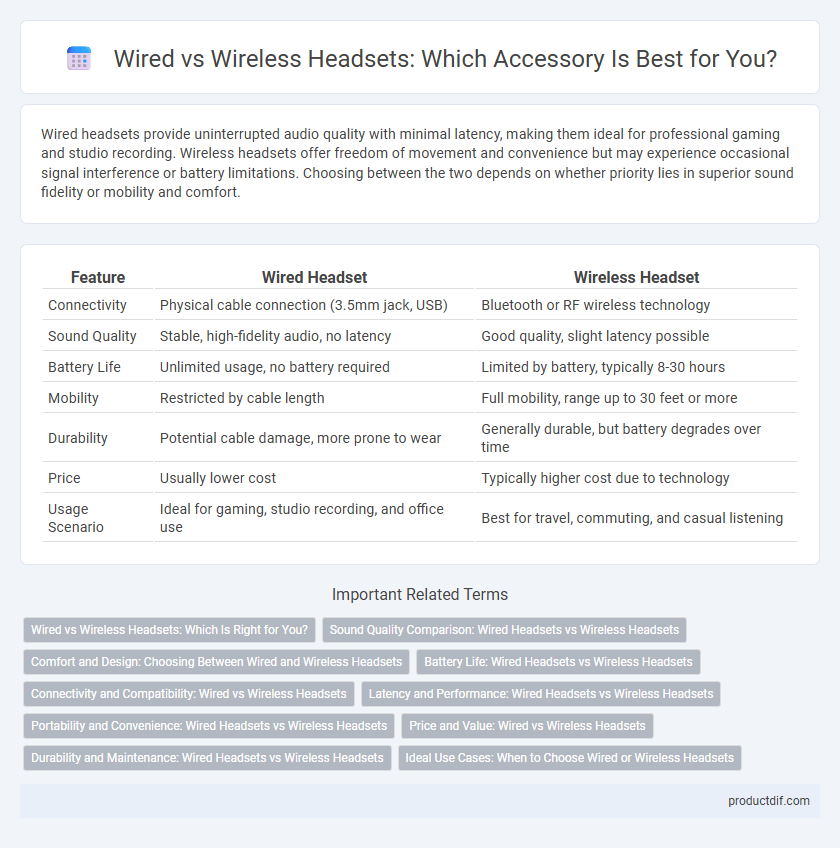Wired headsets provide uninterrupted audio quality with minimal latency, making them ideal for professional gaming and studio recording. Wireless headsets offer freedom of movement and convenience but may experience occasional signal interference or battery limitations. Choosing between the two depends on whether priority lies in superior sound fidelity or mobility and comfort.
Table of Comparison
| Feature | Wired Headset | Wireless Headset |
|---|---|---|
| Connectivity | Physical cable connection (3.5mm jack, USB) | Bluetooth or RF wireless technology |
| Sound Quality | Stable, high-fidelity audio, no latency | Good quality, slight latency possible |
| Battery Life | Unlimited usage, no battery required | Limited by battery, typically 8-30 hours |
| Mobility | Restricted by cable length | Full mobility, range up to 30 feet or more |
| Durability | Potential cable damage, more prone to wear | Generally durable, but battery degrades over time |
| Price | Usually lower cost | Typically higher cost due to technology |
| Usage Scenario | Ideal for gaming, studio recording, and office use | Best for travel, commuting, and casual listening |
Wired vs Wireless Headsets: Which Is Right for You?
Wired headsets offer consistent audio quality and zero latency, making them ideal for professional gamers and audiophiles who demand precise sound. Wireless headsets provide greater mobility and convenience, utilizing Bluetooth or RF technology for untethered listening, but may experience occasional signal interference or latency. Choosing between wired and wireless headsets depends on the priority of sound fidelity versus freedom of movement in your daily use.
Sound Quality Comparison: Wired Headsets vs Wireless Headsets
Wired headsets typically deliver superior sound quality due to a direct, uncompressed audio signal that ensures minimal latency and interference, making them ideal for audiophiles and professional use. Wireless headsets rely on Bluetooth technology, which can introduce compression and occasional signal drops, potentially affecting audio fidelity and causing slight delays. Advanced codecs like aptX and LDAC improve wireless sound quality but still generally fall short of the consistent clarity and depth provided by wired connections.
Comfort and Design: Choosing Between Wired and Wireless Headsets
Wired headsets often provide a snug fit with less bulk, making them comfortable for extended use due to their lighter weight and minimal battery requirements. Wireless headsets prioritize ergonomic design with features like adjustable headbands, cushioned ear cups, and freedom of movement, enhancing user comfort during active or prolonged sessions. The choice between wired and wireless headsets largely depends on individual preferences for weight, mobility, and fit tailored to specific use cases.
Battery Life: Wired Headsets vs Wireless Headsets
Wired headsets do not rely on batteries and provide continuous use without the need for charging, making them ideal for extended listening sessions. Wireless headsets depend on built-in rechargeable batteries, typically offering between 8 to 40 hours of playback, with battery life decreasing over time. Battery management and charging frequency are important considerations when choosing wireless headsets for uninterrupted audio performance.
Connectivity and Compatibility: Wired vs Wireless Headsets
Wired headsets offer consistent connectivity through direct physical connections, eliminating latency and interference concerns common in wireless models. Wireless headsets rely on Bluetooth or RF signals, providing greater mobility but potentially facing compatibility issues with devices lacking specific wireless protocols. Compatibility varies as wired headsets universally connect via standard audio jacks, while wireless options depend on device support for Bluetooth versions or proprietary technology.
Latency and Performance: Wired Headsets vs Wireless Headsets
Wired headsets offer near-zero latency and consistent audio performance due to direct analog connections, making them ideal for gaming and professional audio applications. Wireless headsets rely on Bluetooth or RF technology, which can introduce slight latency and potential interference, sometimes affecting sound synchronization and clarity. Advanced wireless models using low-latency codecs like aptX Low Latency minimize delay, but wired headsets still lead in delivering uninterrupted, high-fidelity audio performance.
Portability and Convenience: Wired Headsets vs Wireless Headsets
Wireless headsets offer superior portability and convenience by eliminating cable clutter and allowing unrestricted movement, ideal for on-the-go use and multitasking. Wired headsets, while dependent on physical connections, provide consistent audio quality without the need for charging, making them reliable for stationary use. The choice depends on the user's preference for mobility versus continuous power and stable connection.
Price and Value: Wired vs Wireless Headsets
Wired headsets typically offer a lower price point with consistent audio quality and zero latency, providing excellent value for budget-conscious consumers. Wireless headsets tend to be more expensive due to integrated Bluetooth technology and rechargeable batteries but offer greater convenience and mobility. Evaluating value depends on individual needs, balancing price against freedom of movement and potential latency issues.
Durability and Maintenance: Wired Headsets vs Wireless Headsets
Wired headsets generally offer superior durability due to fewer electronic components prone to failure, with cables allowing easier repair or replacement compared to integrated wireless parts. Wireless headsets require regular battery maintenance and firmware updates, which can affect longevity and performance over time. Proper care for wired headsets typically involves cable management to prevent damage, while wireless models demand charging cycles and attention to connectivity issues.
Ideal Use Cases: When to Choose Wired or Wireless Headsets
Wired headsets are ideal for professional audio environments, such as studios or gaming setups, where low latency and consistent sound quality are crucial. Wireless headsets excel in mobility-focused scenarios like commuting, office meetings, or workouts, offering freedom of movement without cable constraints. Choosing between wired and wireless headsets depends on prioritizing audio fidelity and reliability versus convenience and range of use.
Wired headset vs wireless headset Infographic

 productdif.com
productdif.com